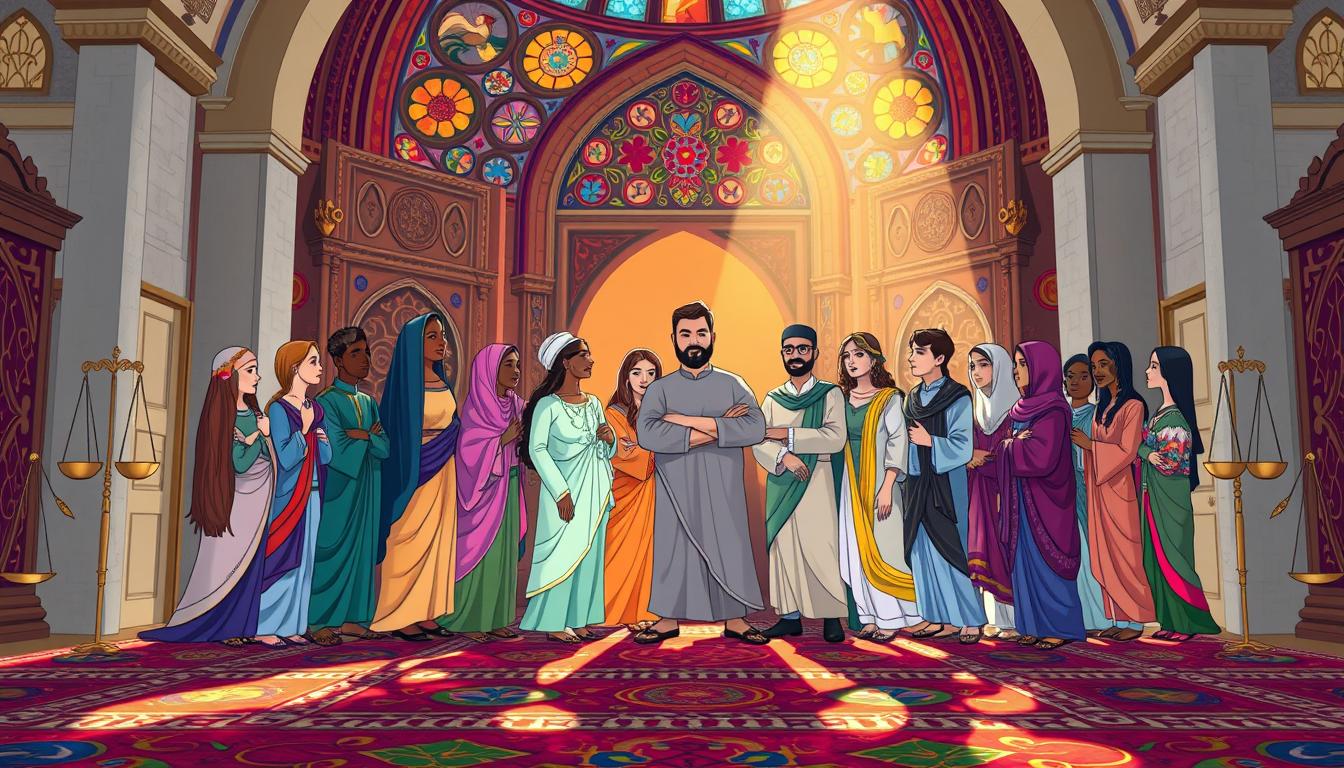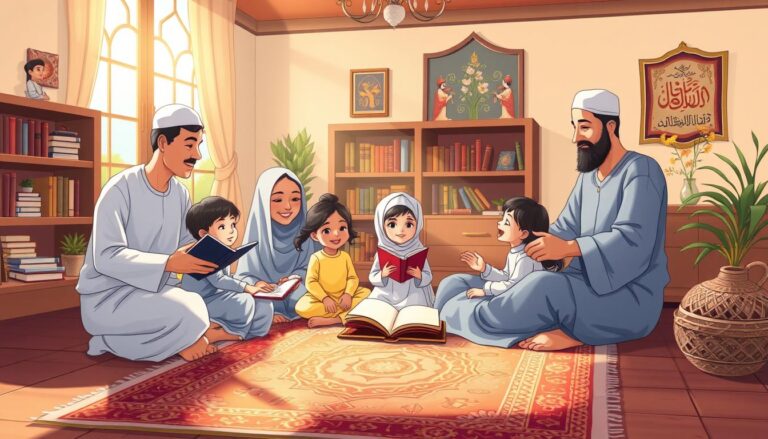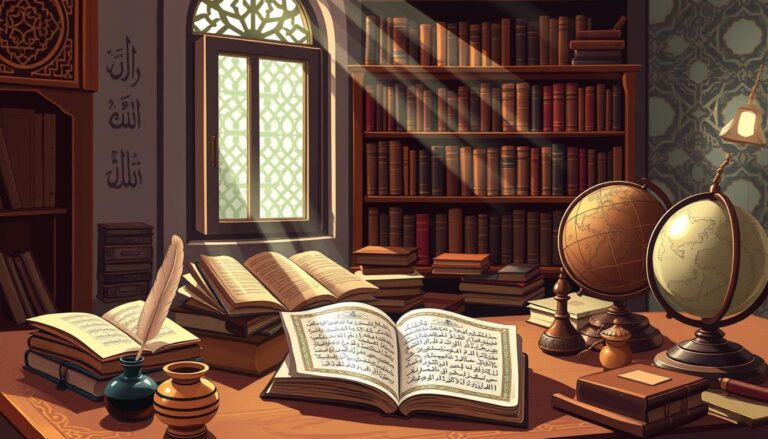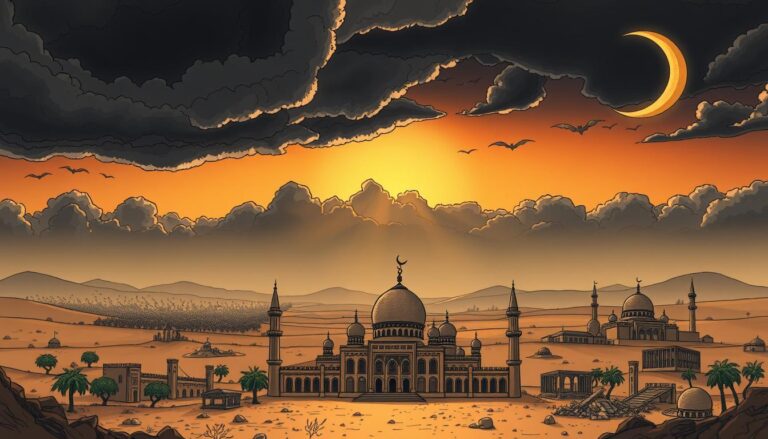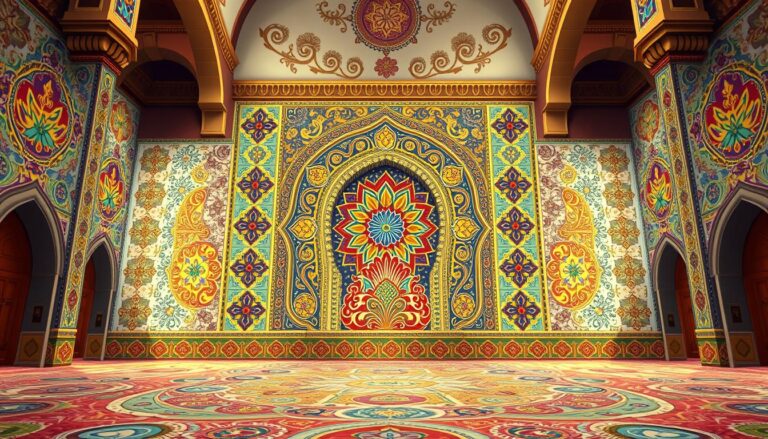5 Islamic Teachings on Social Justice and Equality
Have you ever thought about how Islam tackles social justice and equality today? This ancient faith brings deep insights that match today’s problems. It highlights compassion and brotherhood as key to a fair society.
Islam stands for equality and human rights with clear principles. These teachings aim to make a world where everyone is treated with respect, no matter their background. The Quran and the life of Prophet Muhammad offer wisdom on building a fair society.
Islamic justice isn’t just for Muslims; it’s for all people. It supports a society where everyone’s freedom is respected and we all work together. This approach to justice is based on the idea of universal brotherhood, a core Islamic teaching.
Key Takeaways
- Islam emphasizes social justice as a fundamental aspect of faith
- The Quran provides a foundation for human equality and dignity
- Islamic teachings promote freedom of conscience and social responsibility
- The concept of universal brotherhood is central to Islamic social justice
- Islamic principles of justice apply to all humanity, not just Muslims
Introduction to Islamic Social Justice
Islamic social justice is key to a fair society. It comes from the Quran and Prophet Muhammad’s teachings. The word ‘Adl’, or justice, is very important in Islam.
In Islam, justice means equality, freedom, and helping others. Everyone is seen as equal by God, no matter their abilities. This belief brings Muslims together as brothers and sisters.
The Islamic economy aims for wealth fairness. Zakat, a required charity, helps the poor. It teaches that wealth is a trust from Allah, not just for personal gain.
“Wealth is not to be hoarded, but circulated for the benefit of all.”
Islamic justice is not just about money. It also supports freedom of thought, protects the weak, and cares for the environment. These goals help everyone live well together.
- Equality before God and law
- Fair distribution of wealth
- Protection of individual rights
- Social responsibility towards community
The Islamic way of justice is a complete plan for a peaceful world. It balances personal freedom with helping others. This approach aims for a fair world for everyone.
The Quranic Foundation of Equality
The Holy Quran teaches us about human equality and universal brotherhood. These ideas are key to Islamic teachings on fairness. Quranic verses tell us that all humans are equal, no matter their race, color, or ethnicity.
Verses Emphasizing Human Equality
A powerful Quranic verse on equality is in Surah Al-Hujurat (49:13):
“O mankind, indeed We have created you from male and female, and have made you into nations and tribes, that you may know one another. Indeed the most honored of you in the sight of Allah is the most righteous.”
This verse says that being righteous is what matters most to Allah. It encourages us to respect and understand each other, no matter our differences.
Prophetic Traditions on Equality
Prophet Muhammad also taught about human equality. He said that no Arab is better than a non-Arab, and no one is better than another based on color, except through piety. This shows that in Islam, it’s our character that counts, not our looks.
The Concept of Universal Brotherhood
Islam teaches us to see everyone as our brother, regardless of their faith. The Quran tells us not to insult others and to treat everyone with respect. Prophet Muhammad taught that doing good for others is what Allah values most.
- Respect for all human life
- Protection of individual privacy
- Prohibition of unjust interference in others’ lives
These teachings are the foundation of Islamic justice. They help build a society based on respect, equality, and brotherhood for all.
The Principle of Economic Justice in Islam
Islamic economics focuses on fairness and equal wealth sharing. It seeks to balance society by preventing wealth concentration. The system encourages ethical business and bans usury, known as riba.
Zakat, a mandatory charity, is key in Islamic wealth sharing. It requires Muslims to donate a part of their wealth to the needy. This act strengthens community bonds and social duty.
“The Quran emphasizes justice, equity, and fairness in wage systems.”
Studies show Islamic economics can lower income gaps. A 2023 study in Islamic Economic Studies found Shariah-compliant wage methods lead to fair pay.
- Equal pay for equal work aligns with Islamic principles
- Performance-based incentive schemes promote fair wage policies
- Social justice complements economic development in Islamic societies
The Islamic view on economic justice goes beyond wages. It stresses meeting basic needs and equal financial benefits. Islamic economics aims to create a united society, filled with love, security, and prosperity for everyone.
5 Islamic Teachings on Social Justice and Equality
Islamic teachings stress the importance of social justice and equality. These values are the base of a fair society. Let’s look at five key teachings that show Islam’s dedication to these ideals.
Freedom of Conscience
Islam believes in the freedom of conscience. The Quran says, “There shall be no compulsion in religion” (2:256). This teaching values individual beliefs and promotes peace.
Equality of All Humans
Islamic teachings say all humans are equal, no matter their race, gender, or status. Prophet Muhammad said, “An Arab has no superiority over a non-Arab, nor does a non-Arab have superiority over an Arab.” This principle helps build a society based on respect.
Social Interdependence
Islam promotes social interdependence and mutual support. The Prophet said, “The believers in their mutual kindness, compassion and sympathy are just like one body.” This teaching strengthens the social fabric.
Fair Distribution of Wealth
Islamic teachings support fair wealth distribution. Zakat, a mandatory charity, helps wealth spread in society. This practice aims to lessen economic gaps and promote justice.
Protection of the Vulnerable
Islam values protecting the vulnerable in society. The Quran often talks about caring for orphans, widows, and the poor. This teaching helps create a safety net for those in need, making society more just.
“Stand out firmly for justice, as witnesses to Allah, even as against yourselves, or your parents, or your kin, and whether it be (against) rich or poor.” – Quran 4:135
Zakat: The Islamic System of Wealth Redistribution
Zakat is a key part of Islamic faith, one of the Five Pillars of Islam. It’s a mandatory gift where Muslims give 2.5% of their savings to those in need. Zakat is all about fairness and sharing wealth, playing a big role in Islamic charity.
Purpose and Benefits of Zakat
Zakat aims to clean wealth and bring economic justice. It helps close the gap between the rich and the poor. Zakat builds a sense of community and responsibility.
Impact on Social Equity
Zakat greatly reduces poverty and economic gaps. The Quran lists eight groups to give to, like the poor and those in debt. This ensures Zakat goes to those who really need it, improving society.
Modern Applications of Zakat
Today, Zakat is a big deal in society and economy. Countries like Malaysia and Pakistan have systems for Zakat. Others use NGOs. These efforts make Zakat more effective in helping society.
- Zakat rates change based on what you own, from 2.5% for money to 5-10% for crops.
- The nisab, or minimum amount, is 87.48 grams of gold to qualify for Zakat.
- But, there are challenges like making sure it’s given right and fitting it into today’s economy.
Zakat keeps growing as a way to share wealth and fight for justice in Muslim communities around the world.
Islamic Teachings on Gender Equality
Islam teaches that men and women are equal. The Quran says both were created from divine breath. This idea is key to understanding women’s rights in Islam.
Islamic feminism fights against old views of male dominance. Female scholars are offering new ways to read the Quran. They focus on understanding verses in their original context.
Women’s rights in Islam include:
- Full property rights before and after marriage
- Equal religious and moral duties
- Protection and support in all life stages
- Abolition of female infanticide
The Quran says, “Whoever does righteousness, whether male or female, while he is a believer – We will surely cause him to live a good life” (16:97). This verse shows that both genders get the same spiritual rewards.
Despite challenges, Islamic views on gender equality are changing. Scholars are looking at old interpretations in a new light. This effort is important for making Islamic communities more inclusive.
Social Justice in Islamic Legal Frameworks
Islamic law, or Sharia, offers a detailed plan for social justice. It covers many areas, like criminal justice, civil rights, and caring for the environment. The Qur’an, the main source of Islamic law, has over 200 verses against injustice and oppression.
Principles of Islamic Criminal Justice
In Islamic criminal justice, fairness and helping people change for the better are key. The idea of ‘adl, meaning justice in Arabic, is at the heart of this system. It focuses on being just, making fair decisions, and helping people become better morally. The Qur’an talks about three kinds of injustice: against God, among people, and within oneself.
Civil Rights in Islamic Law
Sharia law values civil rights a lot. It defends personal freedoms and ensures everyone is treated equally. Rights include speaking freely, practicing religion, and owning property. The system rejects unfair treatment and aims for fairness for all, no matter their background.
Environmental Stewardship
Islamic law also cares deeply about the environment. It sees humans as caretakers of the Earth. This means people and societies must protect and use natural resources wisely. This view matches today’s efforts to save the environment, showing Islamic teachings are still relevant today.
“The Earth is green and beautiful, and Allah has appointed you his stewards over it.” – Prophet Muhammad
Islamic legal frameworks aim to build a fair and balanced society. They want to protect individual rights, foster social harmony, and keep the environment safe for the future.
Historical Examples of Islamic Social Justice
Islamic history is filled with examples of social justice. These show how Islamic teachings were put into action. They highlight Muslim leaders and societies working to make systems fair for everyone.
The Caliphate of Umar ibn al-Khattab
Umar ibn al-Khattab, the second caliph, was a symbol of justice. He started a public treasury and a social security system for the poor. His goal was to share wealth fairly, no matter who you were.
Social Welfare in the Ottoman Empire
The Ottoman Empire lasted for centuries and focused on social welfare. They set up charitable foundations called waqfs. These provided education, healthcare, and food, showing Islamic values of community care.
These examples from Islamic history show leaders following social justice teachings. They inspire today’s societies to aim for fairness and equality for all.
Source Links
- Islamic Perspectives on Social Justice – GlobalSadaqah.com Blog
- Social Justice in Islam
- Microsoft Word – EJBM-Vol.8 No.4 2016.docx
- Organizational and Business Ethics Imperative MS.pdf
- Social Justice
- Equality in Islam
- Human Rights in Islam
- Justice in the workplace: Islamic principles for wage determination
- A Sacred Duty: Islam and Social Justice | Yaqeen Institute for Islamic Research
- 5 Verses From the Holy Quran on Justice
- Social Justice in Islam | Salamislam
- Social Justice in Islam – Islam Faith
- Zakat (obligatory charity) | Islamic World Class Notes | Fiveable
- Zakat
- Five things you need to know about women in Islam: Implications for advancing women’s rights in the Middle East
- Gender Equity in Islam
- More Than Just Law: The Idea of Justice in the Qur’an | Yaqeen Institute for Islamic Research
- Social Justice and Islamic Jurisprudence
- The Islamic Basis of Social Work in the Modern World – International Journal of Social Work Values and Ethics
- Islamic concepts of social justice – (Sociology of Religion) – Vocab, Definition, Explanations | Fiveable
- Islamic Law and Justice for All?
- Justice and Equality in Islam (Islam 6.1)

